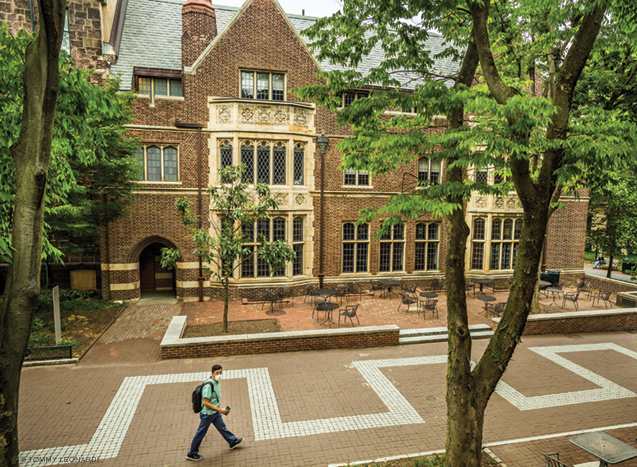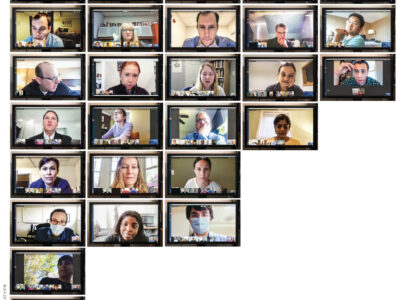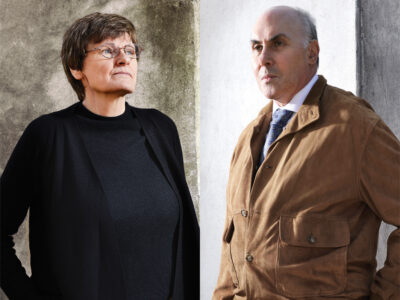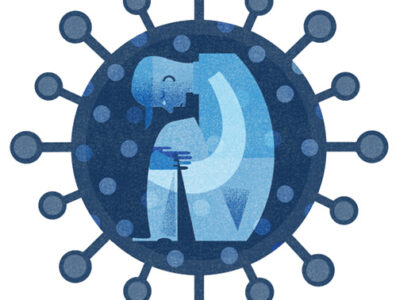
After initially inviting students back to campus for a hybrid model of instruction, Penn reversed course with a fully remote fall semester.
Benoit Dubé, Penn’s chief wellness officer, used a colorful metaphor to describe what the past few months have been like being part of the University’s recovery planning group to determine plans for the fall 2020 semester. “It’s kind of like your car’s going 60 miles per hour,” he said, “and you’re trying to change the tire at the same time.”
Like every institution navigating the COVID-19 pandemic, Penn has been trying to make sure the wheels don’t fall off. And after a couple of detours and turns, the University in the end settled on what’s likely the safest route.
After initially inviting students back to campus to partake in a “hybrid model” of instruction, the University announced on August 11 “the deeply disappointing news that with only very limited exceptions for international students and those students dealing with significant housing or personal hardships, we will not be able to accommodate undergraduate students in University housing.”
The revision came after two previous announcements outlined more in-person options for the fall semester. In late June, the University unveiled its hybrid model of instruction in which large lectures would be conducted online while smaller classes would have an in-person option. As COVID cases surged, Penn updated its plans a month later, moving to almost all virtual instruction (with a few in-person exceptions, such as clinical simulations for nursing students and some research work for graduate and professional students) and requiring all undergraduates to be tested for COVID before and after arriving on campus, among other measures.
But “unfortunately, COVID-19 continues to spread at an alarming rate across the country, with approximately 2 million new cases reported just over the past month,” Penn President Amy Gutmann, Provost Wendell Pritchett Gr’97, Executive Vice President Craig Carnaroli W’85, and Perelman School of Medicine Dean J. Larry Jameson wrote in their August 11 message to the Penn community. “The progression of the disease is evident in many states from which Penn welcomes thousands of students. The sheer number of students who by Pennsylvania public health recommendation would now upon arrival—or based upon testing or high-risk exposure—need to go into a two-week quarantine is untenable.”
The University announced that tuition will be rolled back by 3.9 percent, freezing it at last year’s rate. The general fee will also be reduced by 10 percent, housing and dining fees will be credited or refunded, and significant increases to the financial aid budget have been made “to assist students and families in this difficult time.”
A key element in the plan to bring students back to campus safely, announced in the July 31 update, was a comprehensive testing program in which all students planning to be at Penn in the fall, whether living on or off campus, had to have a negative COVID-19 test within 14 days prior to arrival after receiving a testing kit at their home address from a private third-party testing lab with which the University contracted. Students then needed to be tested upon arrival on campus and were required to quarantine until receiving a negative result, with some others required to take an additional third test.
But less than two weeks later (and about two weeks before students would have started to move into their dorms), University officials said that “supply chain issues have more severely limited the availability and the turnaround time of COVID testing than medical experts foresaw. Since we last communicated, we learned that our planned pretesting program regimen would not be possible.”
Dubé said that the University had considered “rescinding or rolling back inviting students to come live on campus” earlier in the summer, keeping campus closed as it did when dorms were depopulated in mid-March for the remainder of the spring semester [“Gazetteer,” May|Jun 2020]. But after consulting with public health experts, they were encouraged by a college housing plan that was “a little more aggressive than other schools” by offering only private bedrooms. He also noted at the time that the plan could still change. “We’re continuously looking at the data,” Dubé said in an interview on August 4. “There is a precedent that if we feel the health and safety of our community is jeopardized we will take swift action.”
Changing course, as Penn did, wasn’t an easy decision. Dubé noted that he had heard passionate feedback from both sides throughout the summer, with some calling the initial decision of bringing in students from around the country irresponsible and unethical while others were grateful for the University creating a responsible pathway to reopening campus for students who wished to return.
A limited number of students may still get the opportunity to do their virtual learning from college housing, if they apply for an exception and are approved. It’s likely other students will live in off-campus houses or apartments in University City, though “it is important to note that with the limited exception of required in-person instruction [such as clinical experiences in nursing], there will be no physical on-campus activities in the fall semester,” the University notice stated. “For the safety of the students and the broader community, we are encouraging all other students not to return to Philadelphia.”
Students who do return to Philly will be offered free testing upon arrival and again seven days later at Houston Hall and will need to be enrolled in the mobile symptom tracking program PennOpen Pass to gain access to labs and other buildings, though very few campus services will be open in person to undergraduates. They also still must adhere to the Student Campus Compact—which, among other things, requires students to collaborate with the University on testing, daily wellness checks with PennOpen Pass, and tracking contacts following a positive test; wear a facial covering outside their place of residence and practice social distancing; wash their hands frequently and use alcohol-based disinfectant wipes to clean surfaces with which they come into contact; be up-to-date on all vaccinations and get a flu shot; and refrain from organizing, hosting, or attending events, parties, or other social gatherings.
Expressing “an enormous sense of sadness” in being unable to offer a hybrid learning experience on campus this fall as originally planned, Penn’s top officials wrote, “We continue to hope that we will be able to welcome students back for the spring semester, and will do everything in our power to maximize that possibility.”
In the meantime, they added, “We will do all that we can to keep each class involved and connected virtually, so that they can continue to interact and share their Penn experience with classmates in a safe and productive way.” —DZ
For more information on the University’s fall semester plans, visit fall-2020-planning.upenn.edu.




